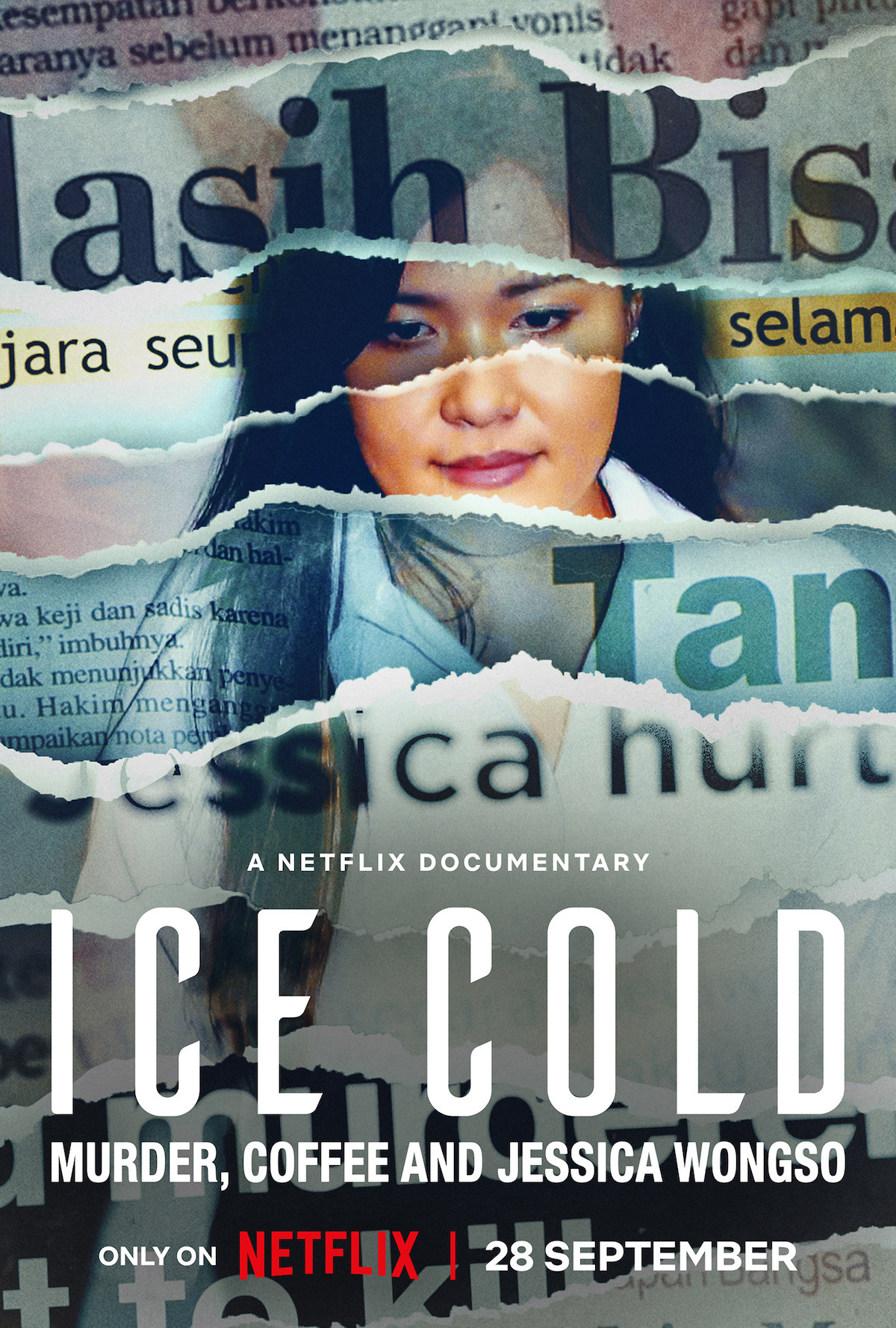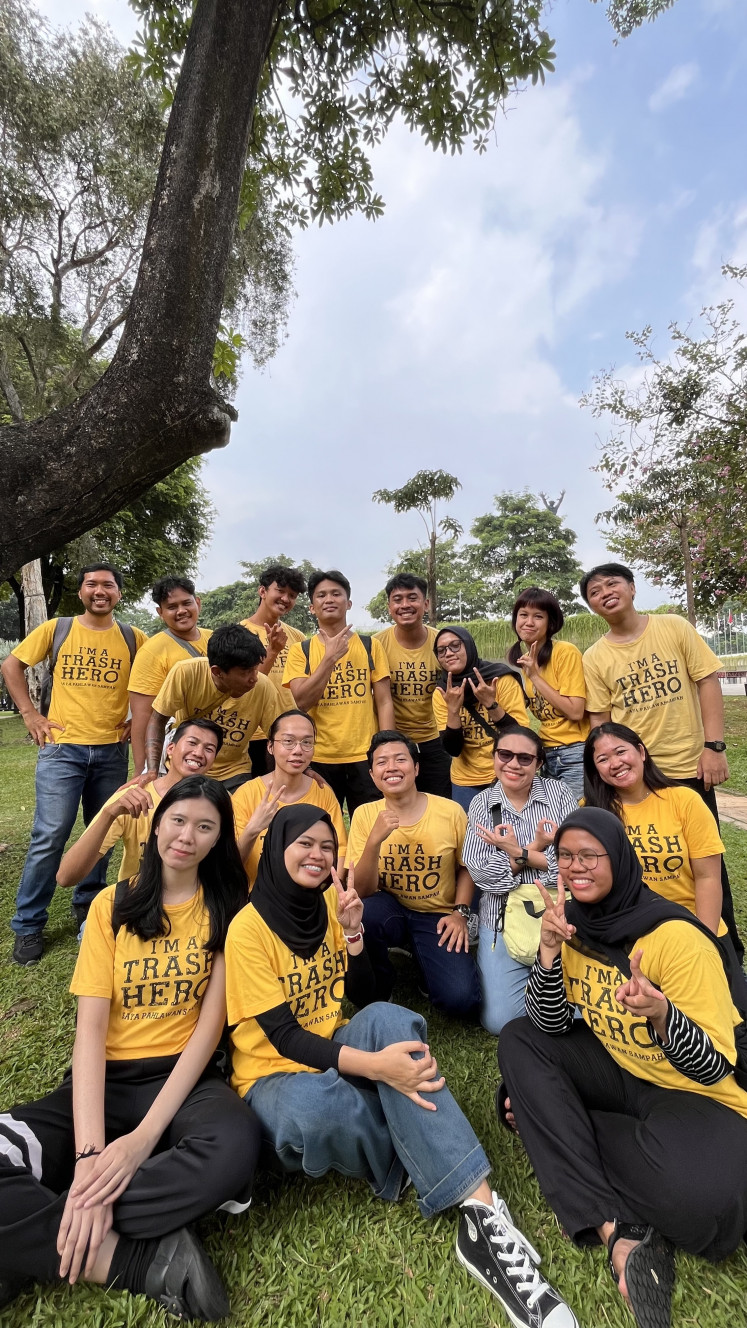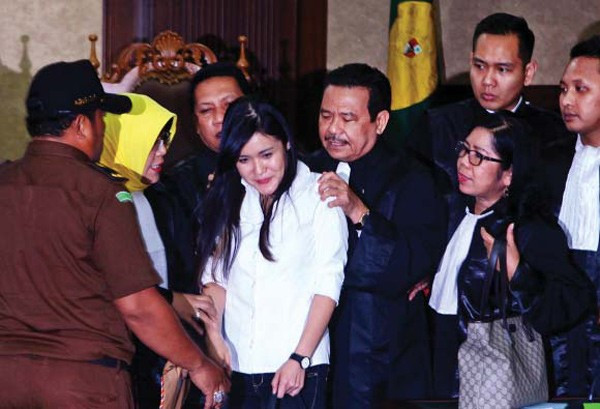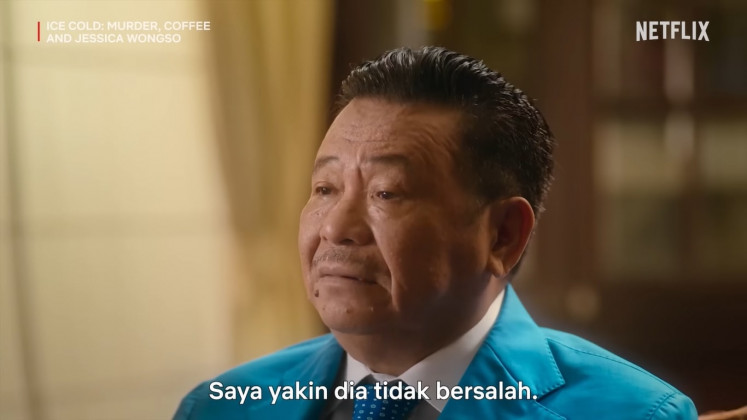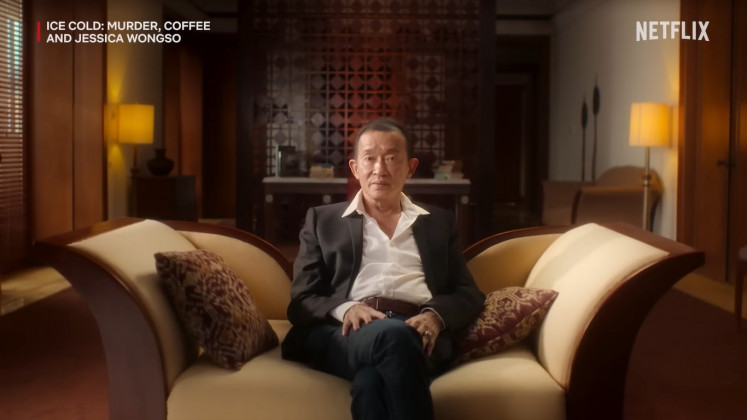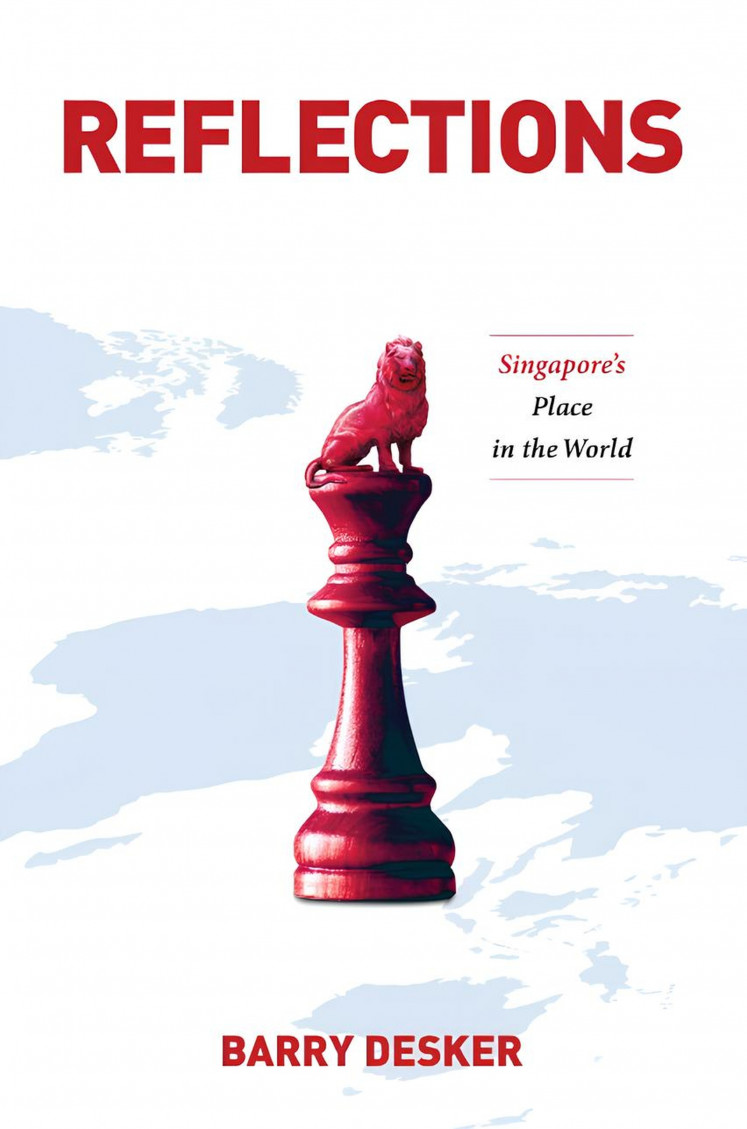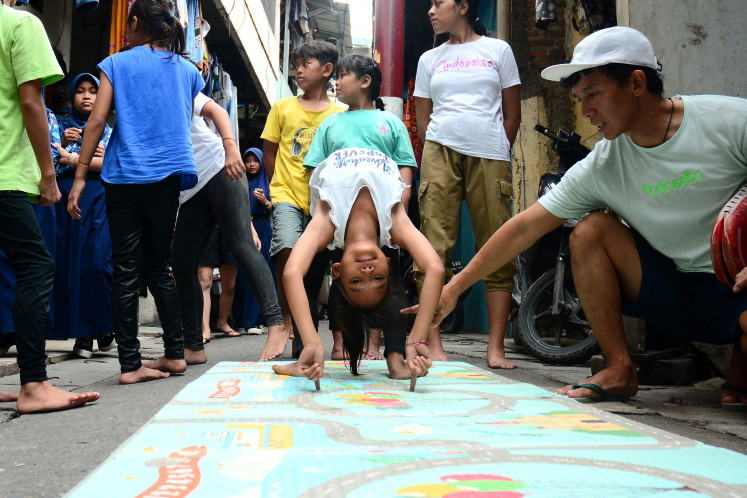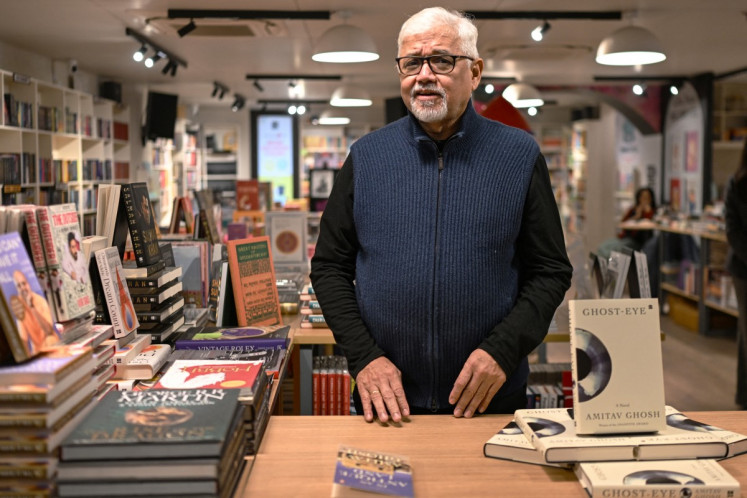Popular Reads
Top Results
Can't find what you're looking for?
View all search resultsPopular Reads
Top Results
Can't find what you're looking for?
View all search resultsGuilty as charged?: New documentary reignites debate on Jessica Wongso's infamous case
Change text size
Gift Premium Articles
to Anyone
A
new Netflix documentary about the controversial “cyanide coffee case” sheds light on Indonesia’s current legal system but does not share any new information regarding the murder of Wayan Mirna Salihin.
*****
“I have so many new questions after watching this documentary,” Yuris (@yuristianaa) posted on social media platform X, formerly called Twitter, on Sept. 29.
Yuris was referring to Ice Cold: Murder, Coffee and Jessica Wongso, the first documentary that streaming service Netflix produced in Indonesia, directed by Rob Sixsmith.
The documentary focuses on the sensational case of Jessica Kumala Wongso, an Indonesian living in Australia who was sentenced to 20 years in prison for the premeditated murder of her friend Wayan Mirna Salihin at a coffee shop in 2016.
The controversial trial prompted several documentaries as well as public speculation, but the new Netflix documentary, released on Sept. 28, has sparked new interest and debate among the public as it has portrayed the case in a different light seven years later.
Widely referred to as the “cyanide coffee case” because of Mirna’s possible cause of death, the incident created a months-long media circus and drew millions of viewers on national television.
“There has never been a similar case [in Indonesia] that has attracted as much public attention as this one,” Hardly Stefano, commissioner of the Indonesian Broadcasting Commission (KPI), says in the documentary.
Read also: Q&A: Looking into Jessica's harrowing hours - is she guilty?Because the case fell under extreme public scrutiny in Indonesia and neighboring countries, Stefano likened it to O. J. Simpson’s trial for the murder of his ex-wife in the United States. But unlike O. J., Jessica was neither famous nor a public figure prior to committing murder.
“I just couldn’t understand why this happened to me,” Jessica said in a Zoom meeting in January 2022 from the Pondok Bambu women’s prison in East Jakarta.
Compiled with new and original interviews, the documentary considers Jessica’s opinion for the first time since her imprisonment.
“It’s been really difficult, it’s just really hard to stay sane every day,” she said, adding that the media frenzy was “traumatic” for her.
Jessica, known as “the smiling coffee killer” for her unrelenting smile, said the judges’ decision might have been different if public attention had not been so intense at the time.
But her interview was cut short by a prison guard because it had “gone too far”. In response to this scene, the Law and Human Rights Ministry’s Corrections Directorate General spokesperson Rika Aprianti said that the interview violated the permit regulations.
“The interview did not relate to the prisoner’s human development intent as required in the Law and Human Rights Ministerial Regulation,” Rika said on Oct. 1, as quoted by detik.com.
All smiles: Jessica Kumala Wongso (fourth left) smiles as her lawyers consoled her after judges found her guilty of murder at the Central Jakarta Court on Oct. 27, 2016. (Courtesy of Netflix/-)Evidence reconstructed
Ice Cold presents various sources to reconstruct the case’s timeline, inclusing witnesses and prosecutors integral in the trial, as well as friends and family of Jessica and Mirna.
But what sets this documentary apart from others is its supportive inclusion of Jessica’s arguments, which had previously been overshadowed by the public’s perception of her as the “crazy lady”, as a street food seller puts it in the documentary.
“There was a ton of confusing and sensational chatter at the time,” Mirna’s twin, Sandy Salihin, says in the film.
Every ounce of Jessica and Mirna’s backgrounds and personal lives were spun into speculation by the millions following the case. Most people assumed that Jessica’s motive was rooted in the rift in their friendship that started when Mirna criticized Jessica’s then-boyfriend.
The film also depicts almost the entire chronology of the trial in the Central Jakarta District Court, which lasted from June 15 to Oct. 27, 2016.
It follows the court drama and shows how some scientific evidence, like the differing doses of cyanide found in the coffee and Mirna’s body, led experts to draw different conclusions. The fact that Mirna’s family did not allow her body to be autopsied further added to the confusion.
Read also: CYANIDE COFFEE TRIAL: When court hearings turn into a show The film also highlights how Jessica was victim of negative profiling in court because of her mannerisms.
“If she wasn’t guilty, she would’ve been crying [in the courthouse],” Mirna’s father Edi Darmawan Salihin says in the documentary.
Experts brought by the prosecutors claimed she was vengeful because her body language and facial expressions did not display remorse.
Forensic psychologist Reza Indragiri debunked this argument in the documentary, saying that “empirical research” is an obsolete theory.
The film wrestled with the controversial verdict and whether the evidence presented against Jessica was enough to put her in jail.
“We relied on circumstantial evidence,” public prosecutor Shandy Handika says in the documentary, adding that evidence from CCTV footage around the time of death was more than enough to prove that only Jessica could have committed the crime.
But some, like Jessica’s chief lawyer Otto Hasibuan, argued that there is no hard evidence proving that Jessica killed Mirna.
Failed effort: Jessica Kumala Wongso’s chief lawyer Otto Hasibuan speaks about his steadfast belief that his client is innocent in the documentary. The subtitles read “I am confident that she is innocent.” (Courtesy of Netflix/-)Different light and new debate
With the documentary’s new angle, more social media users in Indonesia and abroad have started to lean more toward Jessica’s side, in contrast with 2016.
“[And] I thought the US government was bad. This was such an unfair case, no full evidence was shown,” user @thatchickalex_ said on X on Sept. 30.
Freelance illustrator Nunu believed that many viewers watching the trial on TV in 2016 had no other sources to rely on, hence the almost uniform opinion that Jessica was guilty.
“As a member of Gen Z, I was part of that crowd that was swayed by the media’s one-sided reporting,” the 24-year-old told The Jakarta Post on Wednesday, adding that people were now more critical of the trial regardless of who they think is guilty.
Ira, a 24-year-old law graduate, thinks that the prosecutors might have forced their hands a bit in this case since their credibility was on the line.
“In a country where the judicial system does not rely on a jury, the public sort of became the jury. So, public opinion did have a strong hold on the case,” she told the Post on Thursday.
Indonesia’s justice system does not use a jury trial system, and instead uses a bench trial involving a judge or a panel of an off number of judges to form a verdict after examining evidence in the court.
Committed: Edi Darmawan Salihin, father of the late Mirna Salihin, talks about his attempt to send his daughter’s killer to prison. (Courteys of Netflix/-)
Former Supreme Court justice Gayus Lumbuun, however, opined that the judges’ verdict was already backed by enough evidence as defined by the Criminal Law Procedures Code (KUHAP), which includes witnesses and expert admissions and how they point to the defendant being guilty.
“That is enough valid evidence, and the verdict was based on this,” Gayus said to the Post on Thursday.
Deputy Law and Human Rights Minister Edward “Eddy” O.S. Hiariej says in the documentary that Jessica and her lawyer simply lost because they were the ones who “couldn’t provide any hard evidence or experts to convince the judge that she wasn’t a murderer.”
But Erasmus Napitupulu, the executive director at the Institute for Criminal Justice Reform, believes that it only casts a light upon Indonesia’s flawed justice system.
“It’s how the Indonesian criminal justice system was able to find someone guilty despite lingering doubts. If you hypothetically think of Jessica’s case as reasonable, then I’ll let you imagine how other cases are carried out in Indonesia,” Erasmus says in the film.
Adythia Utama, a Jakarta-based documentary filmmaker, assessed that the documentary itself is quite neutral in its presentation. Facts supporting the argument that Jessica is guilty, like her 14 criminal offenses in Australia, are still shown in the latter half of the film.
“Every documentary has an angle, and chances of bias always exist,” Adythia said to the Post on Thursday.
“But I think, at the end, Ice Cold wants to expose the ways in which Indonesia’s judicial system is flawed,” he added.

